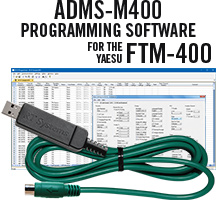FTM-400 RADIO PROGRAMMING SOFTWARE

The ADMS-M400 Programmer is designed to give you the ease and convenience of programming the memories and set menu options of your radio from your PC.
Memory Channels Include:
500 Band A Memory Channels
500 Band B Memory Channels
18 Band A Limit Memories (9 pair)
18 Band B Limit Memories (9 pair)
5 Band A Call Channels
5 Band B Call Channels
Other Menu Item Categories Include:
Common 1 and 2
DTMF/Internet
APRS
APRS Beacon
Group Messaging
The Radio Programmer Is for so Much More than Just Memory Management
The programming process begins by first installing the program then installing (and allowing) the drivers for the cable. Be sure to complete both of these steps.

Next, make all the connections between the radio and the computer and complete Communications | Get data from radio. This “syncs” the radio and computer. Even if the radio is not yet set up with memory channels, there are details that the programmer needs to get from the radio.
Start setting up details for your radio in a “factory fresh” file (File|New) or in the file that was created when you did Communications | Get data from the radio. Begin by entering a receive frequency (that will be the frequency published for the repeater). When you press Enter or Tab to leave the Receive frequency field, the program will complete details for the channel. Then customize Name and Tone to match the details you have for that local repeaters.
Use the links to external data sources (File | External data) built right into the programmer to access repeater details for your area or for a location you plan to visit. Then with just a few button clicks, you have a file with hundreds of entries and all you typed was your location (i.e., zip code or city).
Save your file as you work. This is a computer, after all, and you would hate to lose your work should the system fail. Actually, create and save as many files as you want or need. You could have one file for home, a different one for the vacation house, another for the trip to your son’s house, another for the yearly 3K run and picnic where you help direct traffic and want the radio to be programmed with only the frequencies for that event. Remember, radio programming is an overwrite process. Everything in the radio is replaced by everything in the file.

A/B Band Limit Memories
Limit Memories are used by the radio for Program Scan. Program the same details for Limit Memories as for regular memory channels.

Radio Menu Settings

Common 1 and Common 2
Use these screens to customize other set menu features of the radio. Check boxes toggle features on or off, drop down menus list all selections and blank boxes for personalized entry add to the ease of setting up your radio exactly like you want it.
The entries on the Settings screens are made for you to "Set and Forget". Once settings are customized, you are prompted to save Before exiting. The saved settings will Be there every time you create a new frequency file.

DTMF/Internet
Enter DTMF and Internet details to customize options for these functions of the radio.

ARPS and APRS Beacon
Use these screens to customize APRS options of the radio. Check boxes toggle features on or off, drop down menus list all selections and blank boxes for personalized entry add to the ease of setting up ARPS options just like you want them.

Group Messaging
Set options and messages for Group Monitor functions.
Preferences

Grid Display
RT Systems now available in English, French, German, Italian, Spanish, Portuguese and Japanese.
Set colors for text (Fore) or background (Back) of alternate rows for easier viewing across the columns.
Freeze columns to keep information on the screen as you scroll to the right of the page.
Hide columns you don't use. Customize your printout: hidden columns do not print.
Use Combo for Check boxes - changes the grid to eliminate check box selections that are disabled on some systems

Memory Defaults
Set options to control auto fill information for memory channel entries.

Font
Set options to control the font in the column headers of the channel entry screens. Select any font and font size available on your computer.

Other
Set options to control how the programmer handles the global Radio Menu Settings file. - Separate (default) handles the global settings of the radio in a "set and forget" fashion. Once you set these up and save the file you won’t have to reset them for a new frequency file. - Together as one gives you the ability to create files that are complete with frequencies and customized global settings. In this mode, each file Begins with factory defaults for every option of the radio.
Check "Get data from Radio" new file option to prevent data loss when you read from your radio into the programmer.
Check "different window" option to make the programmer for a different radio run in completely separate window rather than in a separate tab of the same window.

Hardware Requirements

Was this article helpful?
That’s Great!
Thank you for your feedback
Sorry! We couldn't be helpful
Thank you for your feedback
Feedback sent
We appreciate your effort and will try to fix the article